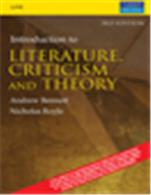An Introduction to Literature, Criticism and Theory, 3/e

|
Author(s):
Author:
Andrew Bennett
- ISBN:9788131718773
- 10 Digit ISBN:8131718778
-
Price:Rs. 960.00
- Pages:356
- Imprint:Pearson Education
- Binding:Paperback
- Status:Available
-
|
Critically, literary theory is a core subject in the study of literature. but theory— especially when it takes the form of ‘-isms'—can often be intimidating or boring for students. bennett & Royle have avoided simply giving potted summaries of ‘-isms' and instead present brief essays on a range of key critical concepts, all of which have more or less familiar names. These concepts are put into practice through readings of particular literary texts.
Table of Content
- The beginning
- Readers and reading
- The author
- The text and the world
- The uncanny
- Monuments
- Narrative
- Character
- Voice
- Figures and tropes
- Creative writing
- Laughter
- The tragic
- History
- Me
- Ghosts
- Moving pictures
- Sexual difference
- God
- Ideology
- Desire
- Queer
- Suspense
- Racial difference
- The colony
- Mutant
- The performative
- Secrets
- The postmodern
- Pleasure
- War
- The end
|
Salient Features
- A new chapter on Film. This chapter explores the ways in which literature helps us to think about film, and, correspondingly, how studying film helps us to think about literature.
- A new chapter on Creative Writing .
- A new chapter on the Mutant: exploring general issues of mutation and mutability, including environmental issues, genetic engineering and cloning.
- A new chapter on War: exploring the questions 'what is war?', 'what is war literature?' and 'in what ways is literary or cultural theory itself at war?'
- All existing chapters updated and revised in light of recent developments in the field.
- Updated and expanded further reading sections.
|
|
|
|
|